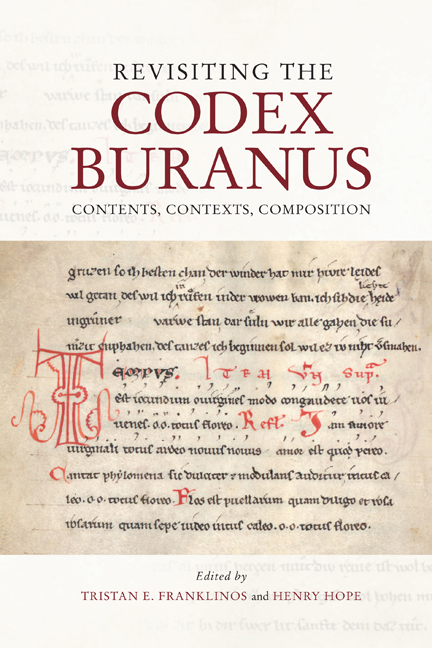Book contents
- Frontmatter
- Contents
- List of Illustrations
- Acknowledgements
- Abbreviations
- Dedication
- Introduction: The Codex Buranus – A Unique Challenge
- Chapter 1 A Modern Reception History of the Codex Buranus in Image and Sound
- Chapter 2 Parody in the Codex Buranus
- Chapter 3 Satire in the Codex Buranus
- Chapter 4 ‘Artes Amatorie Iam Non Instruuntur’: Learned and Erotic Discourse in the Carmina Burana
- Chapter 5 Classical Learning and Audience in the Carmina Amatoria: A Case-Study on CB 92
- Chapter 6 Rape, the Pastourelle, and the Female Voice in CB 185
- Chapter 7 Rethinking the Carmina Burana III: The Poetry of Peasants
- Chapter 8 Predestination and God’s Grace: The Salvific Architecture of the Religious Songs in the Codex Buranus
- Chapter 9 Revisiting the Plays of the Codex Buranus
- Chapter 10 Revisiting the Music of the Codex Buranus
- Chapter 11 Locating the Codex Buranus: Notational Contexts
- Chapter 12 Plurilingualism in the Codex Buranus: An Intercultural Reconsideration
- Chapter 13 Compilation, Contrafacture, Composition: Revisiting the German Texts of the Codex Buranus
- Afterword: multiformis armonia, scolaris symphonia
- List of Manuscripts
- Bibliography
- Index
- General Index
- Studies in Medieval and Renaissance Music
Chapter 2 - Parody in the Codex Buranus
Published online by Cambridge University Press: 16 September 2020
- Frontmatter
- Contents
- List of Illustrations
- Acknowledgements
- Abbreviations
- Dedication
- Introduction: The Codex Buranus – A Unique Challenge
- Chapter 1 A Modern Reception History of the Codex Buranus in Image and Sound
- Chapter 2 Parody in the Codex Buranus
- Chapter 3 Satire in the Codex Buranus
- Chapter 4 ‘Artes Amatorie Iam Non Instruuntur’: Learned and Erotic Discourse in the Carmina Burana
- Chapter 5 Classical Learning and Audience in the Carmina Amatoria: A Case-Study on CB 92
- Chapter 6 Rape, the Pastourelle, and the Female Voice in CB 185
- Chapter 7 Rethinking the Carmina Burana III: The Poetry of Peasants
- Chapter 8 Predestination and God’s Grace: The Salvific Architecture of the Religious Songs in the Codex Buranus
- Chapter 9 Revisiting the Plays of the Codex Buranus
- Chapter 10 Revisiting the Music of the Codex Buranus
- Chapter 11 Locating the Codex Buranus: Notational Contexts
- Chapter 12 Plurilingualism in the Codex Buranus: An Intercultural Reconsideration
- Chapter 13 Compilation, Contrafacture, Composition: Revisiting the German Texts of the Codex Buranus
- Afterword: multiformis armonia, scolaris symphonia
- List of Manuscripts
- Bibliography
- Index
- General Index
- Studies in Medieval and Renaissance Music
Summary
In the High Middle Ages, students of Latin depended first and foremost on their reading of the auctores for learning vocabulary and syntactic structures, since grammatical treatises contained only a rudimentary approach to syntax and lexicographical works only rarely discussed idioms and constructions. John of Salisbury describes how Bernard of Chartres’ students learnt the expressions that they found in the auctores by heart and practised them in their exercises. Outside of the schoolroom, other situations precipitated the memorising of texts: liturgy was repeated on a daily, weekly, and yearly basis and hence liturgical texts were bound to be remembered; higher education, in turn, consisted mainly in reading, glossing, and commenting. Unsurprisingly, therefore, authorial allusion (intended or otherwise) is a universal phenomenon in medieval Latin literature. Various references to other texts, however, function on different levels (from the simple use of an apt expression to an essential constituent of meaning), and only the competence of an audience to identify the origin of such references makes of a textual reprise a true intertextual marker.
These observations also apply to parody as a specific form of intertextuality. In parody, similarity and difference between a text and its model are equally relevant. On the one hand, the repetition of characteristic words, traits of style, or motifs generates resemblance; on the other, strategies like inversion, displacement (for instance a change of context or a shift of emphasis), or irony underline difference. This is a broadly conceived understanding of parody that recurs again and again in the history of Western literature. Critical works on postmodernism, particularly Linda Hutcheon's theoretical discussion of parody, have also taken such a view. In the scholarship on medieval Latin literature, such a broad understanding of parody appears occasionally, but it is more usual to understand parody specifically as a mocking reference to an earlier text. The relationship between a parody and its model is, of course, more complex and varied than one of mere ridicule, as the biblical and liturgical parodies of the Carmina Burana discussed in the first section of this chapter show. These texts also encourage us to interrogate the attitudes which they seemingly display toward vice and its (un)acceptability in clerical milieux. In the second section of this chapter, a number of love poems are used to explore the difficulties surrounding the recognition of a given parodic model.
- Type
- Chapter
- Information
- Revisiting the Codex BuranusContents, Contexts, Compositions, pp. 39 - 66Publisher: Boydell & BrewerPrint publication year: 2020



